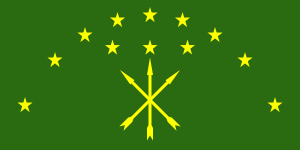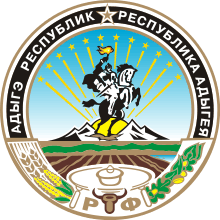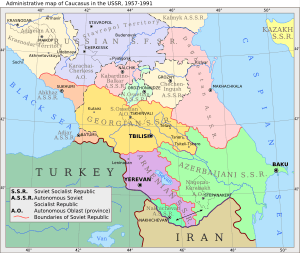Adygea
The Republic of Adygea (/ˌɑːdɪˈɡeɪə/;[13] Russian: Респу́блика Адыге́я, tr. Respublika Adygeya, IPA: [ɐdɨˈɡʲejə]; Adyghe: Адыгэ Республик, Adygæ Respublik), also known as the Adyghe Republic, is a federal subject (a republic) of Russia. It is geographically located in the North Caucasus region of European Russia, and is part of the Southern Federal District. Adygea covers an area of 7,600 square kilometers (2,900 sq mi), the fifth-smallest Russian federal subject by area, with its territory an enclave within Krasnodar Krai. Adygea has a population of 439,996 (2010 Census).[8]
Republic of Adygea | |
|---|---|
| Республика Адыгея | |
| Other transcription(s) | |
| • Adyghe | Адыгэ Республик |
| Anthem: "Anthem of the Republic of Adygea"[1] | |
.svg.png) | |
| Coordinates: 44°39′N 40°00′E | |
| Country | Russia |
| Federal district | Southern[2] |
| Economic region | North Caucasus[3] |
| Established | July 3, 1991[4] |
| Capital | Maykop[5] |
| Government | |
| • Body | State Council (Khase)[6] |
| • Head[6] | Murat Kumpilov |
| Area | |
| • Total | 7,600 km2 (2,900 sq mi) |
| Area rank | 80th |
| Population (2010 Census)[8] | |
| • Total | 439,996 |
| • Estimate (2018)[9] | 453,376 (+3%) |
| • Rank | 74th |
| • Density | 58/km2 (150/sq mi) |
| • Urban | 50.9% |
| • Rural | 49.1% |
| Time zone | UTC+3 (MSK |
| ISO 3166 code | RU-AD |
| License plates | 01 |
| OKTMO ID | 79000000 |
| Official languages | Russian;[11] Adyghe[12] |
| Website | http://www.adygheya.ru/ |
Maykop is the capital and the largest city of Adygea, home to one-third of the republic's population.
Adygea is one of Russia's ethnic republics, primarily representing the indigenous Adyghe people, a Circassian ethnic group that form 25% of the Republic's population, while ethnic Russians form a majority at 60%, and with minority populations of Armenians and Ukrainians. The official languages of Adygea are Russian and the Adyghe language.
Geography
Adygea lies in Russia's Southern Federal District of Eastern Europe, in the foothills of the Northwestern Caucasus in the Caucasus Mountains System, with plains in the northern areas and mountains in the southern area. Forests (mainly of European beech, oak, and maple) cover almost 40% of its territory.
- Area — 7,600 km2 (2,900 sq mi).
- Borders — the Republic of Adygea is entirely surrounded by Krasnodar Krai.
- Highest point — Chugush Mountain: 3,238 m (10,623 ft).
Rivers
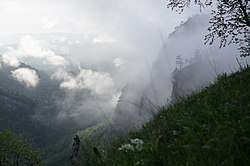
The 870-kilometer (540 mi) long Kuban River is one of the major navigable rivers in the Caucasus region. It forms part of the northern border between the Republic of Adygea and Krasnodar Krai.
Other rivers include:
- Belaya River
- Chokhrak River
- Dakh River
- Fars River
- Khodz River
- Kisha River
- Bolshaya Laba River — (forming part of the eastern border between Adygea and Krasnodar Krai)
- Psekups River
- Pshish River
- Sakhray River
- Sukhoy Kurdzhips River — flows near the archaeological site at Mezmaiskaya cave.[14]
Lakes
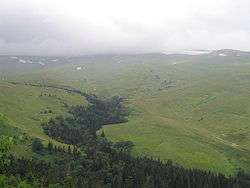
The republic has no large lakes. However, the several large reservoirs include:
- Krasnodarskoye Reservoir
- Oktyabrskoye Reservoir
- Shapsugskoye Reservoir
- Tshchitskoye Reservoir
Mountains
The republic's major mountains and peaks range in height from 2,000–3,238 metres (6,562–10,623 ft), and include:
- Chugush Mountain — 3,238 m (10,623 ft)
- Mount Fisht — 2,868 m (9,409 ft)
- Oshten Mountain
- Pseashkho Mountain
- Shepsi Mountain
Natural resources
The republic is rich in oil and natural gas. Other natural resources include gold, silver, tungsten, and iron.
Climate
- Average January temperature: −0.5 °C (31.1 °F)
- Average July temperature: +23 °C (73 °F)
- Average annual precipitation: 70 centimeters (28 in)
February 15, 2010 recorded the absolute maximum for the winter months—in the capital, the city of Maykop, the temperature was 23.4 °C (74.1 °F).
History
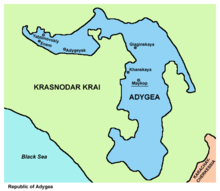
The Cherkess (Adyghe) Autonomous Oblast was established within the Russian SFSR on July 27, 1922, on the territories of the Kuban-Black Sea Oblast, primarily settled by the Adyghe people.[15] At that time, Krasnodar was the administrative center. It was renamed Adyghe (Cherkess) Autonomous Oblast on August 24, 1922, soon after its creation. In the first two years of its existence the autonomous oblast was a part of the Russian SFSR, but on October 17, 1924, it was transferred to the jurisdiction of the newly created North Caucasus Krai within the RSFSR.[16]
It was renamed Adyghe Autonomous Oblast (AO) in July 1928. On January 10, 1934, the autonomous oblast became part of the new Azov-Black Sea Krai, which was removed from North Caucasus Krai. Maykop was made the administrative center of the autonomous oblast in 1936. Adyghe AO became part of Krasnodar Krai when it was established on September 13, 1937.
On July 3, 1991, the oblast was elevated to the status of a republic under the jurisdiction of the Russian Federation.[4] The first President of the republic was Aslan Dzharimov, elected on 5 January 1992.[17]
Relations between the Adyghe and ethnic Russians in Adygea are currently good. Russians make up two-thirds of the population within Adygea.[18] The current Head of Adygea is Murat Kumpilov.
Divisions
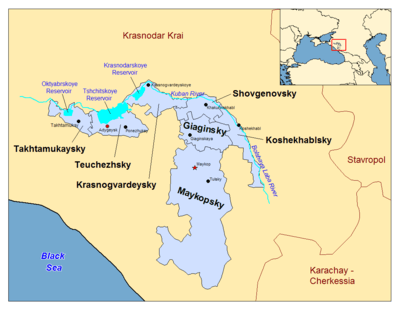
The Republic of Adygea is administratively divided into seven districts (raions), two cities/towns, and (at a lower administrative level) five urban-type settlements. Municipally, the republic is divided into two urban okrugs, five urban settlements, and 46 rural settlements.
| Name | Local Name | Area in km2 | Population Census[19] 2010 | Population Estimate[20] 1 Jan 2018 |
|---|---|---|---|---|
| Cities (republican municipal districts) | ||||
| Maykop | Городской округ Майкоп |
58.6 | 166,540 | 165,279 |
| Adygeysk | Городской округ Адыгейск |
32.4 | 14,659 | 15,207 |
| Districts | ||||
| Giaginsky District | Гиагинский м.р. | 790.0 | 31,766 | 31,394 |
| Koshekhablsky District | Кошехабльский м.р. | 606.7 | 30,422 | 29,726 |
| Krasnogvardeysky District | Красногвардейский м.р. | 725.5 | 30,868 | 31,765 |
| Maykopsky District | Майкопский м.р. | 3,667.4 | 58,439 | 60,107 |
| Takhtamukaysky District | Тахтамукайский м.р. | 440.0 | 69,662 | 82,909 |
| Teuchezhsky District | Теучежский м.р. | 710.0 | 20,643 | 20,802 |
| Shovgenovsky District | Шовгеновский м.р. | 521.4 | 16,997 | 16,187 |
| Adygea Republic | Республика Адыгея | 7,600.0 | 439,996 | 453,376 |
- Note "м.р." above is an abbreviation for "муниципальный район" (Municipal District)
Demographics
- Population: 439,996 (2010 Census);[8] 447,109 (2002 Census);[21] 432,588 (1989 Census).[22]
Vital statistics
| Average population | Live births | Deaths | Natural change | Crude birth rate (per 1000) | Crude death rate (per 1000) | Natural change (per 1000) | Fertility rates | |
|---|---|---|---|---|---|---|---|---|
| 1970 | 386,000 | 5,681 | 3,307 | 2,374 | 14.7 | 8.6 | 6.2 | |
| 1975 | 396,000 | 5,900 | 3,907 | 1,993 | 14.9 | 9.9 | 5.0 | |
| 1980 | 409,000 | 6,610 | 4,828 | 1,782 | 16.2 | 11.8 | 4.4 | |
| 1985 | 423,000 | 6,966 | 5,283 | 1,683 | 16.5 | 12.5 | 4.0 | |
| 1990 | 436,000 | 6,171 | 5,375 | 796 | 14.2 | 12.3 | 1.8 | 2.06 |
| 1991 | 439,000 | 5,912 | 5,905 | 7 | 13.5 | 13.5 | 0.0 | 1.96 |
| 1992 | 444,000 | 5,306 | 5,969 | - 663 | 12.0 | 13.5 | -1.5 | 1.73 |
| 1993 | 447,000 | 4,774 | 6,662 | -1 888 | 10.7 | 14.9 | -4.2 | 1.54 |
| 1994 | 449,000 | 4,907 | 6,519 | -1 612 | 10.9 | 14.5 | -3.6 | 1.59 |
| 1995 | 450,000 | 4,798 | 6,475 | -1 677 | 10.7 | 14.4 | -3.7 | 1.55 |
| 1996 | 450,000 | 4,625 | 6,382 | -1 757 | 10.3 | 14.2 | -3.9 | 1.49 |
| 1997 | 450,000 | 4,430 | 6,302 | -1 872 | 9.8 | 14.0 | -4.2 | 1.42 |
| 1998 | 451,000 | 4,340 | 6,245 | -1 905 | 9.6 | 13.9 | -4.2 | 1.38 |
| 1999 | 450,000 | 3,879 | 6,215 | -2 336 | 8.6 | 13.8 | -5.2 | 1.22 |
| 2000 | 448,000 | 4,071 | 6,710 | -2 639 | 9.1 | 15.0 | -5.9 | 1.27 |
| 2001 | 447,000 | 4,212 | 6,566 | -2 354 | 9.4 | 14.7 | -5.3 | 1.31 |
| 2002 | 447,000 | 4,540 | 6,715 | -2 175 | 10.2 | 15.0 | -4.9 | 1.39 |
| 2003 | 446,000 | 4,634 | 6,929 | -2 295 | 10.4 | 15.6 | -5.2 | 1.40 |
| 2004 | 444,000 | 4,648 | 6,645 | -1 997 | 10.5 | 15.0 | -4.5 | 1.37 |
| 2005 | 443,000 | 4,550 | 6,726 | -2 176 | 10.3 | 15.2 | -4.9 | 1.32 |
| 2006 | 441,000 | 4,606 | 6,686 | -2 080 | 10.4 | 15.2 | -4.7 | 1.33 |
| 2007 | 440,000 | 5,210 | 6,454 | -1 244 | 11.8 | 14.7 | -2.8 | 1.50 |
| 2008 | 440,000 | 5,601 | 6,558 | - 957 | 12.7 | 14.9 | -2.2 | 1.60 |
| 2009 | 439,000 | 5,513 | 6,219 | - 706 | 12.5 | 14.2 | -1.6 | 1.66 |
| 2010 | 439,000 | 5,721 | 6,065 | - 476 | 13.0 | 14.1 | -1.1 | 1.70 |
| 2011 | 441,000 | 5,511 | 6,197 | - 554 | 12.5 | 13.8 | -1.3 | 1.66 |
| 2012 | 444,000 | 5,700 | 5,924 | - 224 | 12.9 | 13.4 | -0.5 | 1.71 |
| 2013 | 445,000 | 5,568 | 5,814 | - 246 | 12.5 | 13.1 | -0.6 | 1.68 |
| 2014 | 448,000 | 5,699 | 5,938 | - 239 | 12.7 | 13.3 | -0.6 | 1.73 |
| 2015 | 450,000 | 5,613 | 5,841 | - 228 | 12.5 | 13.0 | -0.5 | 1.72 |
| 2016 | 453,000 | 5,451 | 5,818 | - 367 | 12.1 | 12.9 | -0.8 | 1.69(e) |
| 2017 | 453,000 | 4,758 | 5,734 | - 976 | 10.5 | 12.7 | -2.2 |
Ethnic groups
According to the 2010 Census,[8] ethnic Russians make up 63.6% of the republic's total population, while the ethnic Adyghe are 25.8%. Other groups include Armenians (3.7%), Ukrainians (1.4%), Kurds (1.1%) and Tatars (0.6%).
| Ethnic group |
1926 Census | 1939 Census | 1959 Census | 1970 Census | 1979 Census | 1989 Census | 2002 Census | 2010 Census1 | ||||||||
|---|---|---|---|---|---|---|---|---|---|---|---|---|---|---|---|---|
| Number | % | Number | % | Number | % | Number | % | Number | % | Number | % | Number | % | Number | % | |
| Adyghe | 50,821 | 44.8% | 55,048 | 22.8% | 65,908 | 23.2% | 81,478 | 21.1% | 86,388 | 21.4% | 95,439 | 22.1% | 108,115 | 24.2% | 109,699 | 25.8% |
| Russians | 29,102 | 25.6% | 171,960 | 71.1% | 200,492 | 70.4% | 276,537 | 71.7% | 285,626 | 70.6% | 293,640 | 68.0% | 288,280 | 64.5% | 270,714 | 63.6% |
| Armenians | 738 | 0.7% | 2,348 | 1.0% | 3,013 | 1.1% | 5,217 | 1.4% | 6,359 | 1.6% | 10,460 | 2.4% | 15,268 | 3.4% | 15,561 | 3.7% |
| Ukrainians | 26,405 | 23.3% | 6,130 | 2.5% | 7,988 | 2.8% | 11,214 | 2.9% | 12,078 | 3.0% | 13,755 | 3.2% | 9,091 | 2.0% | 5,856 | 1.4% |
| Others | 6,415 | 5.7% | 6,313 | 2.6% | 7,289 | 2.6% | 11,198 | 2.9% | 13,939 | 3.4% | 18,752 | 4.3% | 26,355 | 5.9% | 14,093 | 3.3% |
| 1 14,610 people were registered from administrative databases, and could not declare an ethnicity. It is estimated that the proportion of ethnicities in this group is the same as that of the declared group.[24] | ||||||||||||||||
Religions
According to a 2012 survey which interviewed 56,900 people,[25] 35.4% of the population of Adygea adheres to the Russian Orthodox Church, 12.6% to Islam, 3% are unaffiliated Christians and 1% are Orthodox Christian believers who don't belong to church or are members of other Orthodox churches. In addition, 30% of the population declares to be "spiritual but not religious", 9% is atheist, and 8.6% follows other religions or did not answer to the question.[25]
Politics
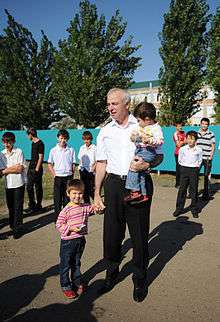
The chief executive of the government of the Republic of Adygea is the Head (called "President" until May 2011), who is appointed for a five-year term. Proficiency in the Adyghe language is a prerequisite for the candidate.[27]
The current Head, Murat Kumpilov (since January 27, 2017), succeeded Aslan Tkhakushinov, initially as acting Head of the region. There is also a directly elected State Council (Khase or Xase—not to be confused with the Adyghe Khase, a union of Adyghe who supported Sovmen for a second term), which comprises the Council of Representatives and the Council of the Republic. Both councils are elected every five years and have 27 deputies each.
The Republic sends three representatives to the parliament of the Russian Federation; one to the State Duma and the other two to the Federation Council.
The Constitution of the Republic of Adygea was adopted on May 14, 1995.
Economy
Even though it is one of the poorest parts of Russia, the republic has abundant forests and rich soil. The region is famous for producing grain, sunflowers, tea, tobacco, and other produce. Hog and sheep breeding are also developed.
Food, timber, woodworking, pulp and paper, heavy engineering, and metal-working are the most developed industries.
Transportation
There is a small airport in Maykop (ICAO airport code URKM). Several rail lines pass through the republic.
Culture
The Adyghe language (Адыгабзэ) is a member of the isolate Northwest Caucasian language family. Along with Russian, Adyghe is the official language of the republic.
There are 8 state and 23 public museums in the republic. The largest museum is the National Museum of the Republic of Adygea in Maykop.
Education
Adyghe State University and Maykop State Technological University, both in the capital Maykop, are the two major higher education facilities in Adygea.
Notable people
- Anatoly Berezovoy (1942—2014), Pilot-Cosmonaut of the USSR.
- Aslan Dzharimov (born 1936), 1st President of the Republic of Adygea.
- Anna Kareyeva (born 1977), handball player.
- Mukharby Kirzhinov (born 1949), weightlifter.
- Andrei Kobenko (born 1982), footballer.
- Nikita Kucherov (born 1993), ice hockey player.
- Vladimir Nevzorov (born 1952), judoka.
- Hazret Sovmen (born 1937), 2nd President of the Republic of Adygea.
- Aslan Tkhakushinov (born 1947), 3rd President of the Republic of Adygea.
- Aslan Tlebzu (born 1981), Adyghe folk musician.
- Konstantin Vasilyev (1942—1976), painter.
See also
- Music in the Republic of Adygea
- Mezmaiskaya cave
- Ethnic cleansing of Circassians
- Adyghe people
References
Notes
- Law #90
- Президент Российской Федерации. Указ №849 от 13 мая 2000 г. «О полномочном представителе Президента Российской Федерации в федеральном округе». Вступил в силу 13 мая 2000 г. Опубликован: "Собрание законодательства РФ", No. 20, ст. 2112, 15 мая 2000 г. (President of the Russian Federation. Decree #849 of May 13, 2000 On the Plenipotentiary Representative of the President of the Russian Federation in a Federal District. Effective as of May 13, 2000.).
- Госстандарт Российской Федерации. №ОК 024-95 27 декабря 1995 г. «Общероссийский классификатор экономических регионов. 2. Экономические районы», в ред. Изменения №5/2001 ОКЭР. (Gosstandart of the Russian Federation. #OK 024-95 December 27, 1995 Russian Classification of Economic Regions. 2. Economic Regions, as amended by the Amendment #5/2001 OKER. ).
- Official website of the Republic of Adygea. Основные сведения Archived July 23, 2013, at the Wayback Machine (in Russian)
- Constitution of the Republic of Adygea, Article 62
- Constitution, Article 7.4.
- Федеральная служба государственной статистики (Federal State Statistics Service) (May 21, 2004). "Территория, число районов, населённых пунктов и сельских администраций по субъектам Российской Федерации (Territory, Number of Districts, Inhabited Localities, and Rural Administration by Federal Subjects of the Russian Federation)". Всероссийская перепись населения 2002 года (All-Russia Population Census of 2002) (in Russian). Federal State Statistics Service. Retrieved November 1, 2011.
- Russian Federal State Statistics Service (2011). "Всероссийская перепись населения 2010 года. Том 1" [2010 All-Russian Population Census, vol. 1]. Всероссийская перепись населения 2010 года [2010 All-Russia Population Census] (in Russian). Federal State Statistics Service.
- "26. Численность постоянного населения Российской Федерации по муниципальным образованиям на 1 января 2018 года". Federal State Statistics Service. Retrieved January 23, 2019.
- "Об исчислении времени". Официальный интернет-портал правовой информации (in Russian). June 3, 2011. Retrieved January 19, 2019.
- Official throughout the Russian Federation according to Article 68.1 of the Constitution of Russia.
- Constitution of the Republic of Adygea, Article 5
- "Adygeya at merriam-webster.com". m-w.com. Retrieved September 23, 2009.
- Baryshnikova, Gennady; John F. Hoffeckerb; Robin L. Burgess (May 1996). "Palaeontology and Zooarchaeology of Mezmaiskaya Cave (Northwestern Caucasus, Russia)". Journal of Archaeological Science. 23 (3): 313–335. doi:10.1006/jasc.1996.0030.
Over 6000 large mammal and numerous small vertebrate remains have been recovered from preliminary excavations at Mezmaiskaya Cave
- Azarenkova et al., p. 154
- под ред. М. Макфола и Н. Петрова (1998). ""Политический альманах России 1997. Том 2. Социально-политические портреты регионов" (Political Almanac of Russia 1997. Vol. 2. Social and Political Portraits of the Regions), online edition" (PDF) (in Russian). Московский Центр Карнеги. Archived from the original (PDF) on June 30, 2007. Retrieved April 17, 2007.
- Richmond, Walter (2008). The Northwest Caucasus: Past, Present, Future. Routledge. p. 146. ISBN 978-1134002498.
- ВПН-2010 (in Russian). Gks.ru. Retrieved February 22, 2014.
- State Committee of the Russian Federation on Statistics.
- www.gks.ru http://www.gks.ru/free_doc/doc_2018/bul_dr/mun_obr2018.rar. Retrieved January 15, 2019. Missing or empty
|title=(help) - Russian Federal State Statistics Service (May 21, 2004). "Численность населения России, субъектов Российской Федерации в составе федеральных округов, районов, городских поселений, сельских населённых пунктов – районных центров и сельских населённых пунктов с населением 3 тысячи и более человек" [Population of Russia, Its Federal Districts, Federal Subjects, Districts, Urban Localities, Rural Localities—Administrative Centers, and Rural Localities with Population of Over 3,000] (XLS). Всероссийская перепись населения 2002 года [All-Russia Population Census of 2002] (in Russian).
- "Всесоюзная перепись населения 1989 г. Численность наличного населения союзных и автономных республик, автономных областей и округов, краёв, областей, районов, городских поселений и сёл-райцентров" [All Union Population Census of 1989: Present Population of Union and Autonomous Republics, Autonomous Oblasts and Okrugs, Krais, Oblasts, Districts, Urban Settlements, and Villages Serving as District Administrative Centers]. Всесоюзная перепись населения 1989 года [All-Union Population Census of 1989] (in Russian). Институт демографии Национального исследовательского университета: Высшая школа экономики [Institute of Demography at the National Research University: Higher School of Economics]. 1989 – via Demoscope Weekly.
- Каталог публикаций::Федеральная служба государственной статистики (in Russian). Gks.ru. May 8, 2010. Retrieved February 21, 2014.
- http://www.perepis-2010.ru/news/detail.php?ID=6936
- "Arena: Atlas of Religions and Nationalities in Russia". Sreda, 2012.
- 2012 Arena Atlas Religion Maps. "Ogonek", № 34 (5243), 27/08/2012. Retrieved 21/04/2017. Archived.
- Казенин, Константин (2009). "Тихие" конфликты на Северном Кавказе (in Russian). Moscow: Regnum. p. 17. ISBN 978-5-91150-030-6.
Sources
- Государственный Совет – Хасэ Республики Адыгея. Закон №90 от 7 июня 2007 г. «О государственных символах Республики Адыгея (текст в ред. от 7 июня 2007 г.)», в ред. Закона №91 от 28 апреля 2012 г. «О внесении изменений в некоторые Законы Республики Адыгея». Вступил в силу со дня официального опубликования. Опубликован: "Советская Адыгея", №112–113, 14 июня 2007 г. (State Council of the Republic of Adygea. Law #90 of June 7, 2007 On the Symbols of State of the Republic of Adygea (text of rev. of June 7, 2007), as amended by the Law #91 of April 28, 2012 On Amending Various Laws of the Republic of Adygea. Effective as of the day of official publication.).
- Закон №168-1 от 14 февраля 1995 г. «О праздичных днях и памятных датах», в ред. Закона №231 от 1 августа 2013 г. «О внесении изменения в статью 3 Закона Республики Адыгея "О праздичных днях и памятных датах"». Вступил в силу 14 февраля 1995 г. Опубликован: "Ведомости ЗС (Хасэ) - Парламента РА", №15, 14 февраля 1995 г.. (Law #168-1 of February 14, 1995 On Holidays and Memorial Dates, as amended by the Law #231 of August 1, 2013 On Amending Article 3 of the Law of the Republic of Adygea "On Holidays and Memorial Dates". Effective as of February 14, 1995.).
- Государственный Совет — Хасэ Республики Адыгея. 10 марта 1995 г. «Конституция Республики Адыгея (текст в ред. от 3 мая 2007 г.)», в ред. Конституционного закона №459 от 30 октября 2015 г. «О поправках к Конституции Республики Адыгея». Опубликован: "Ведомости ЗС (Хасэ) — Парламента РА", №16, 6–10 марта 1995 г. (State Council of the Republic of Adygea. March 10, 1995 Constitution of the Republic of Adygea (text of rev. of May 3, 2007), as amended by the Constitutional Law #459 of October 30, 2015 On the Amendments to the Constitution of the Republic of Adygea. ).
- Президент Республики Адыгея. Распоряжение №46-рп от 2 апреля 2007 г. «Об организации официального Интернет-сайта исполнительных органов государственной власти Республики Адыгея». (President of the Republic of Adygea. Directive #46-rp of April 2, 2007 On Creation of the Official Website of the Executive Organs of State Power of the Republic of Adygea. ).
- Азаренкова, А. С.; Бондарь, И. Ю.; Вертышева, Н. С. (1986) [1986]. Основные административно-территориальные преобразования на Кубани (1793–1985 гг.) (in Russian). Краснодарское книжное издательство. p. 394.
External links
| Wikimedia Commons has media related to Adygea. |
| Wikivoyage has a travel guide for Adygea. |
- Адыгэ Республикэм и Лъэпкъ театр (in Adyghe)
- The Voice of Circassians (Adyghe Language)
- (in Russian) Official website of the Republic of Adygea
- Overview of the Republic of Adygea (Kommersant newspaper)
- Official Website of the Adyghe State University
- (in Russian) Official Website of the Adyghe State University
- (in Russian) Official Website of the National Museum of the Republic of Adygea
